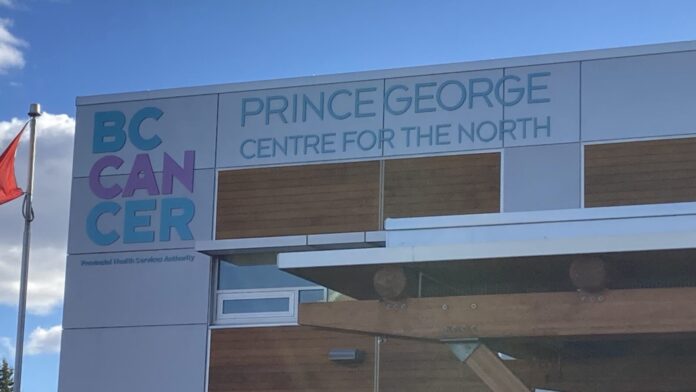The BC Cancer Centre for the North in Prince George is leading a new clinical trial that could change how cancer is treated.
The SIMPLIFY trial is testing whether a single, highly precise dose of radiation can effectively treat oligometastatic cancer in common types such as breast, prostate and lung.
The first patient treated through the trial was Violet MacLean, a grandmother of eight from Quesnel.
She was facing stage four breast cancer for nearly a decade.
“She happens to be the first person that was put on the international trial, and it’s great that we managed to accrue her from Prince George,” said Executive Medical Director at the Cancer Centre for the North and radiation oncologist Dr. Robert Olson.
“She was randomized to get that single treatment, so the way that these trials work is you can either get the experimental treatment, which is the single treatment, or the more typical five treatments when cancers spread to your bones.”
After one SABR treatment in May, her scans are showing a positive response.
“With just one treatment, I was able to get back to my life quickly,” MacLean said.
“I always said if I had the opportunity to join a trial I would say ‘yes.’ I’m sure I’m here today because others took part in trials before me and I believe they will cure this disease.
“Back when the Centre opened, like 13 years ago, shortly after we opened, we were part of the first trial that randomized patients to get SABR, which was this high dose of precision radiation versus not,” Olson said.
“So we were part of it, then we led the next study, which was improving side effects, and most recently, we’ve almost completed a study which again is randomizing to radiation or not to definitively answer the treatment, do people live longer when they get it, and it looks like they do.”
Olson noted the most recent study, SIMPLIFY, randomized getting a single treatment against multiple.
“We know by expanding the use of radiation, we actually could take up more resources,” he said.
“Being Canadian, we care about being efficient and not using up too many healthcare resources, and so this study is patient-centric, in that it’s a single treatment is better for her for example, but anybody, you know, Terrace or an Indigenous community, a single-treatment is less time away from their home and their family, but also, from a health-economic point of view, one treatment is clearly cheaper than if we do five.”
Olson also said this could help with waitlists as well.
“We used to be sending patients to the States, so our waitlists are getting long, but we’ve made some advances and investments by the government to shorten those waitlists, but we need to do it more,” he said.
In terms of next steps, Olson said MacLean is just one patient, but they need about 600 patients to answer if side effects and outcomes are the same.
“Prince George is too small to collect that many patients, and so we’re expanding,” he said.
“We’re open in five centres now, two in Ireland, three in Canada, all in B.C. so far.”
Olson said they’re looking at Quebec, Ontario, the U.S., Australia, and Scotland, and these locations are lined up for either this year or next year.
He added this treatment is aimed towards those who have stage four cancer.
“It mostly will impact them, as we’re giving more evidence to show that giving radiation is effective, doesn’t have a high side-effect profile, but also can make people live longer, and now in this case, we can do it in a more efficient way to save resources,” he explained.
Olson said this could be expanded into other situations as well.
“For example, if you give a single treatment to a lymph node, even when it’s not stage four, when it’s early stage, if we can show it’s safe, then we could extrapolate those results to saying it’s going to be safe to do so in somebody who has prostate cancer, for example, that hasn’t spread,” he said.
“It will allow us to answer this question for patients with metastatic cancer, but also some important safety information for other patients with earlier stage disease.”
Olson said the trial relies on funding from the BC Cancer Foundation.
Something going on in the Prince George area you think people should know about?
Send us a news tip by emailing [email protected].







